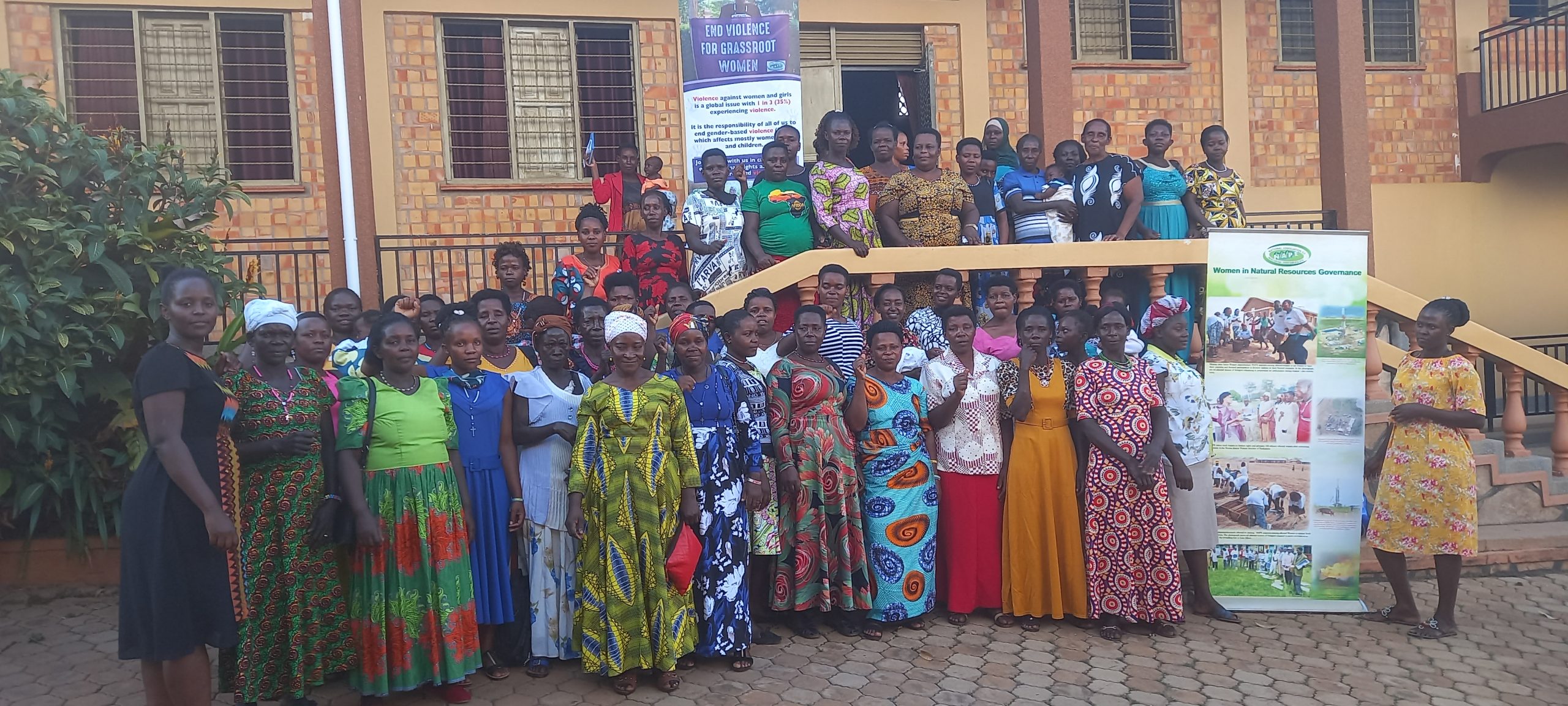Wednesday, February 7th, 2024 | By

The National Association of Professional Environmentalists (NAPE) has intensified the mobilization of grassroots women to build collective power and solidarity in the face of socio-economic and environmental injustices by extending Rural Women’s Movement to Central Region.
NAPE has been at the forefront of mobilizing and organizing grassroots women and supporting them to challenge Gender Based Violence, women’s rights violations and energy and climate injustices in Albertine Graben since the start of 2018 mainly concentrating in the Oil producing districts of Hoima, Kikuube, Buliisa and Nwoya. NAPE has deepened grass root women advocacy mainly against oil injustices of illegal land grabs, Sexual and Gender based violence, human rights abuses, food and ecosystem destruction at the hands of oil corporates.
Boosting of around 35,000 grass root women, and foreseeing further challenges presented mainly by the 1,443 km long East African Crude Oil and gas pipeline (EACOP), mobilization has now extended to the central region with the target of mobilizing over 5000 grassroots women by the end of 2026 and 15,000 by end of 2027 mobilized in at least 8 districts that will be crossed by the EACOP.
“The journey starts now with a target to at least identifying 50 grass root women activists, informal groups and community/local leaders with at least a membership of 600 grass root women, girls and male comrades by close of 2024 and building their knowledge and understanding on feminist analysis, values, approaches and the integration of contextual feminist knowledge in these informal groups of marginalized women. The marginalized women include widows, young women and girls, single mothers, women with disabilities, women living with HIV/AIDS and women living in displaced peoples’ camps, small house hold farmers, ecosystem dependent groups who are at a high risk of displacement and abuse from ongoing oil and gas extraction, oil pipeline, and other project developments”, saysPrecious Naturinda spearheading the field mobilization drive in Kiboga and Kyankwanzi districts.
Rural women’s Movement is an initiative of grassroots women that fights for women’s rights, energy and climate and environmental justice while creating alternative models of development in Uganda. The women’s movement has a goal of building an ecofeminist perspective of development alternatives.
The women’s organizing has come at the backdrop of profit-oriented investors that are purchasing or leasing land for large land based investments like oil and gas mining and sugarcane growing. The struggle for land is deeply intertwined with women’s rights. Women make 76% of Uganda’s agricultural labor force and are more dependent on land for their livelihood. Furthermore, as a result of their gender roles, they are overwhelmingly responsible for food security of their families. Despite this dependence and responsibility, it is estimated that they own 7% to 20% of the land, and are the worst hit by land grabs and all other forms of gender injustices calling for an urgent need to reverse this narrative.
Bwengye Rajab, the head of NAPE programs says “‘the Movement strengthening project-2024’ initiated in Kikuube and Kyankwanzi; two of the many EACOP affected districts, will mainly focus on introducing discussions on feminism and collective organizing and engagement, knowledge and experiences already attained by movement members in the nucleus oil rich districts of Hoima, Kikuube and Buliisa under NAPE past mentorship and support”.
In 2006, Uganda discovered an estimated 6.5 million barrels of crude oil in Albertine Graben. Since then, the government and oil companies’ negotiations seeking to access to land from communities for oil development projects have been characterized by displacements, low compensation, violence, land degradation and loss of livelihoods.
According to the Feminist Participatory Research (FPAR) that was done by NAPE in 2017, the violent evictions, loss of livelihoods, food insecurity, environmental degradation, violence and discrimination at household level caused by land rush for extractives and monoculture have largely affected women.
But with the movement, NAPE has supported women to collectively claim their rights, resist unjust land grabs and rebuild their livelihoods. They are coming together to resist the land rush.
Lucy Mbuubi, one of the rural women activists of the movement from Kikuube district says movements empower women to know their land and compensation rights. Kikuube is one of the areas where women have suffered injustices related to loss of land-ownership rights and inadequate compensation for their land that was taken over by government and oil companies for the construction of oil roads, the oil refinery and the East African Crude Oil Pipeline (EACOP).
“The women affected by EACOP and the construction Kabale-Kiziranfumbi have resisted poor compensation and challenged the government to ensure that women also sign for compensation together with men; thanks to the women’s movement that has built and strengthened women’s capacity to resist oppressive laws that do not protect women’s rights,” says Mbuubi crediting NAPE and Woman Kind for initiating the movement philosophy in the oil region.
According to Mr. Bwengye of NAPE, women in central region including Kiboga and Kyankwanzi districts that are equally affected by oil projects and other large land based investments need to be mobilized and empowered to fight against the injustices given the magnitude of impacts expected from the EACOP.
Bwengye says the 1,443 km long heated crude oil pipeline will be the longest the world has ever seen traversing 10 districts in Uganda, 25 in Tanzania, displacing around 100,000 communities, destroying key ecosystems and generally causing a food, environmental and climatic disaster in the region.
Frank Muramuzi, the NAPE Executive Director says this is the main reason why NAPE and other Civil Society collaborators have resorted to taking Total Energies-The French Oil giant exploiting Oil and gas reserves in Uganda to French Courts for Violating the French Duty of Vigilance Law” That expects French corporates to put Rights of Oil host communities and the Environment High on their development Agendas and which they have totally failed to respect in Uganda.
Copyright ©2025 Community Green Radio . All Rights Reserved. Designed : Lwegatech